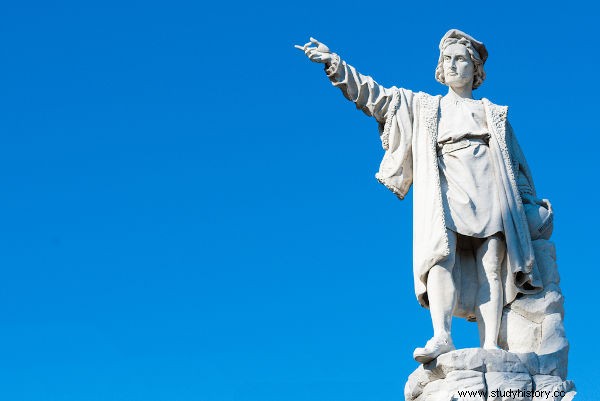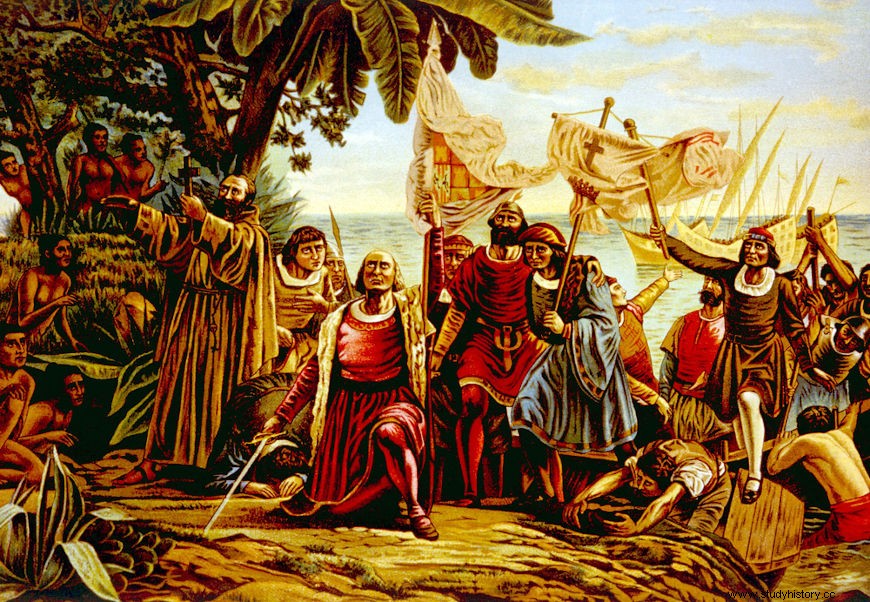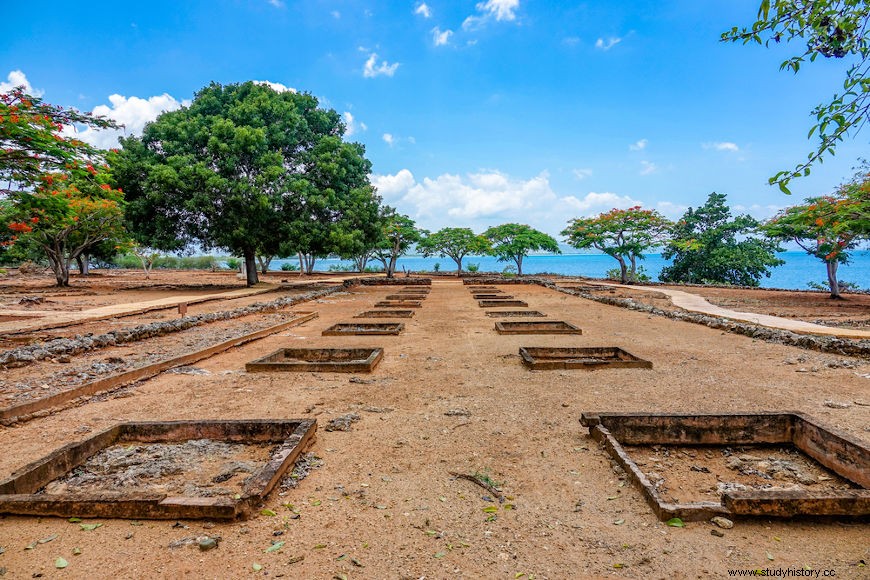Christopher Columbus is the name of the navigator responsible for taking a Spanish expedition to America in 1492. The arrival of the Spaniards to the American continent is commonly known as the discovery of America. Columbus' expedition was intended to show that it was possible to reach Asia by sailing west.
Columbus trained as a navigator in Genoa, traveled to different places and set out in search of financing for his expedition to Asia. Funded by the Catholic kings Isabel of Castile and Ferdinand of Aragon, he managed to make four trips to America. He has been criticized by historians for having started the process of genocide of the indigenous people.
Login also :Understand how the process of conquest of Spanish America took place
Early Years

Christopher Columbus was born in 1451 in Genoa , a city in Italy today. Historians have very limited knowledge about the birth and youth of this historical figure. There is no certainty in which month of 1451 he was born, and for a long time there were doubts whether he was even born in Genoa.
Columbus' father was Domenico Colombo and worked as a weaver, and his mother's name was Susanna Fontarossa . Not much is known of Columbus' education, but it is believed that he was well educated because he had erudition. Columbus had four brothers:Bartolomeu, Giacomo, Bianchinetta and Giovanni.
-
Career as a sailor
Aged 14 years old , Columbus began to study to become a boat pilot and cartographer . Soon he began to participate in commercial expeditions, working for two influential families in Genoa — the Di Negroes and the Spinolas. Between 1474 and 1475, Columbus was in the Aegean Sea, near Greece, as well as Lisbon, Portugal and Bristol, England.
There are reports that he was in Iceland, but some inaccuracies in the information about this event have led some historians to doubt this. In 1477, Columbus settled in Portugal and there married Felipa Moniz Perestrello , the daughter of an influential but impoverished family. With Felipa, Columbus had a son, Diego Colombo .
Search West
At the time of Columbus, the theory of sphericity da Earth it was already quite influential, and the Genoese himself was an adherent of it. In Portugal, Columbus lived all the climate of the Great Navigations , and became interested in expeditions that sought to reach India. However, his interests in how to make this trip were different from those in Portugal.
The Portuguese Crown had a great interest in navigation along the African coast, because while the route to India was being sought, it would be possible to establish itself on the African coast and maintain important commercial contacts . Columbus, influenced by the idea of sphericity of the Earth, believed in a route to the west.
The Genoese explorer's ideas were based on knowledge gained from authors such as Toscanelli , Ptolemy and Marco Polo . The great thing about this was that Columbus believed the Earth would be smaller than it actually is , and yet he did not know that in the middle of the way there was an unknown continent. Columbus' optimism about his adventure was largely due to that.
The search for the west, however, was an arduous task mainly because it needed funding . So Columbus spent the entire 1480s looking for royal funding. In this period he presented his idea to d. John II , king of Portugal, and it consisted of sailing to Cipango (Japan), from there heading to India.
This proposal was questioned by other subject matter experts advising the king, and the funding request was denied. The refusal of the Portuguese king added to the death of his wife (the year is uncertain) made Columbus move to Spain. He wished to have an audience with Isabel of Castile and Fernando de Aragon , known as the Catholic Kings.
There was interest on their part, but Castile's (future Spain) priority was to defeat the Moors installed in Granada. Then Columbus again sought support from Portugal, but was again rejected. He even sought support from Henry VII , King of England, and was also denied.
Finally, Columbus began exchange letters with France , and when he considered going there to seek the support of the French king, he was invited to a new audience with the Catholic kings . In it the Spanish kings found his demands too high and resolved to dismiss him again, but through Diego de Deza he got what he wanted.
Columbus' agreement with Castile took place on April 17, 1492 and became known as the Capitulations of Santa Fe . In that document, Columbus demanded the title of admiral; to be named viceroy and governor of the lands he discovered; be entitled to a considerable percentage of all expedition profits; be named as “don”; receive two million maravedis to organize the expedition; and have the benefits he would receive passed on to his children.
Login also :Iberian Union – when Portugal and Spain formed a single kingdom
Voyages of Columbus

In all, Columbus accomplished four travel to America. However, he never recognized that he had arrived on a new continent and died believing he had reached Asia. In the first voyage, Columbus received the merits of having arrived in unknown lands, considered as Asian territory. On the second voyage, he initiated Spanish colonization, but on the third and fourth voyages, his reputation dropped dramatically.
The first trip it left Spain on August 3, 1492 and was made up of three ships:Pinta, Niña and Santa María. After facing numerous challenges, this first expedition arrived at an island in the Caribbean, on October 12, 1492 . This island was called by the natives Guanahani and is located in the present territory of the Bahamas.
On this trip Columbus was still in Hispaniola , present-day Haiti and the Dominican Republic, and had contact with indigenous people and a local chief called Guacanagari . The Genoese explorer established peaceful contacts, receiving authorization from Guacanagari to leave some men, as one of his vessels had sunk. However, he kidnapped indigenous people to take them to Spain.
Before returning, he founded a village called Navidad, and when he returned to Spain he was received as a hero, though some were suspicious of his achievements. On September 23, 1493, Columbus began his second travel, and was at the head of 1200 men, demonstrating that there was already a colonizing effort on the part of Spain.

On this second trip, Columbus came across the settlement of Navidad destroyed, and then founded a new settlement called La Isabela . He also explored new locations in the Caribbean and fought natives for control of Hispaniola.
The third trip began on May 30, 1498, and in it Columbus took workers and supplies to supply La Isabela. He also explored the Caribbean to find evidence that he was in Asia and arrived in the Orinoco Delta region off the coast of Venezuela. Upon arriving at La Isabela, he found the settlement in a state of penury and the inhabitants in revolt.
The Spaniards who had settled in La Isabela did not want to do the hard work necessary to survive in the colony. Many gave up the settlement, and the Spaniards were up in arms with the natives, trying to enslave them. On that voyage, Columbus was imprisoned because of the bad administration he carried out in the Spanish colony. The Royal Inquisitor, Francis de Bobadilla , arrested him and took him handcuffed back to Spain.
Finally, the fourth trip it was begun on May 9, 1502, and was only possible because Columbus was pardoned by Queen Elizabeth. On this last trip, he continued the search for evidence that he had reached Asia. He explored the coast of Central America and came across reports that there was another ocean nine days' walk away. He returned to Spain in 1504 and never returned to America.
Read more :Exploitation of pau-brasil - the first economic activity implemented by the Portuguese in Brazil
Death
After his fourth voyage, Columbus settled in Seville and spent his last days without the prestige of yore. He never received the amounts of riches promised at the Capitulations of Santa Fe and died May 20, 1506 , aged 54 years. Columbus' sons Diego and Fernando sued the Spanish Crown, demanding what had been promised to their father.
